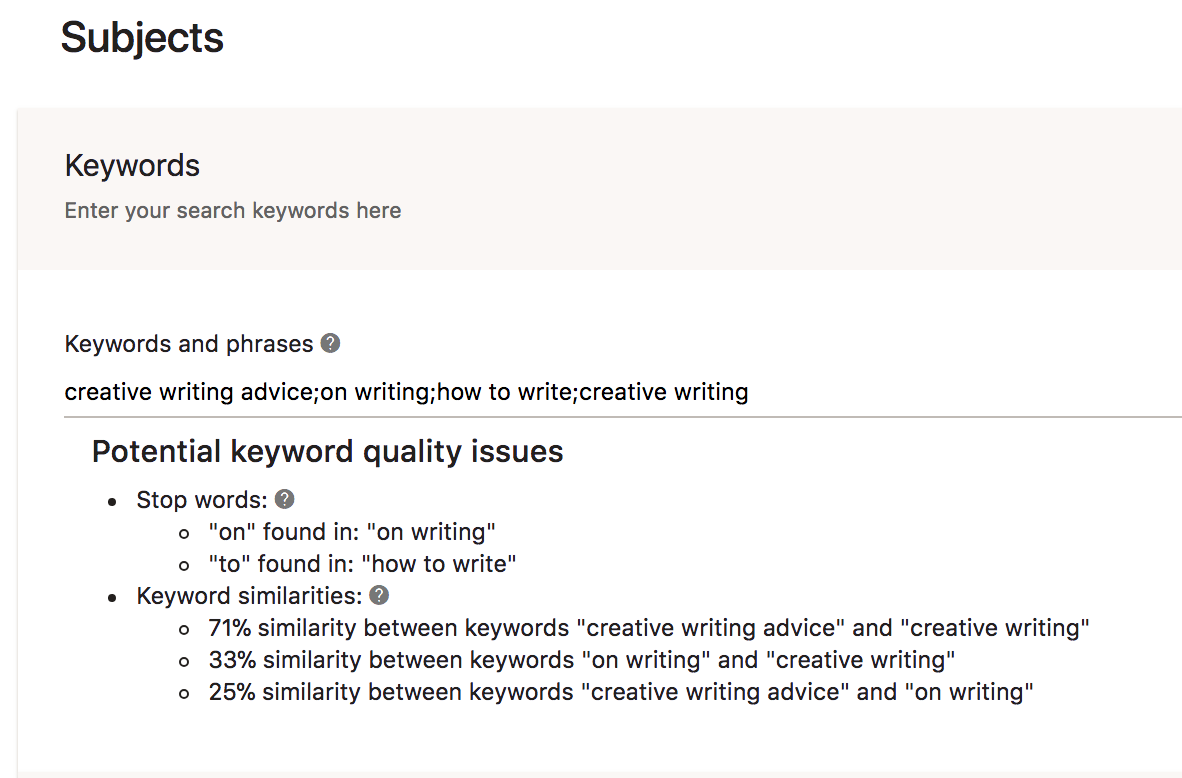Our keywords best practice advice is based on information gathered from across the industry, but it’s an inexact science without thorough guidance from Amazon.
In general, carefully chosen keywords help discoverability of your ebooks on Amazon.
Keywords format
- Keywords should be a string of words separated by semi-colons, for example: murder; magic; Gothic; strong female lead; doctors
- Amazon says that it accepts up to seven keywords or phrases and suggests putting them in a logical order
- Avoid quotation marks. If you enter
complex suspenseful whodunit,
only people who type all of those words will find it. For better results, enter: complex suspenseful whodunit. Then, customers can search for any of those words. - Avoid very long keyword phrases. Amazon will ignore ALL keywords on a product if any one of the keywords is more than 250 bytes long.
Tips from Amazon*
- Avoid repeating information covered elsewhere in the product’s metadata (title, contributors, etc.)
- Single words work better than phrases, and specific words work better than general ones
- Look at the left hand menu on Amazon for inspiration for keywords
- Useful keyword types are:
- Setting (Colonial America)
- Character types (single dad, veteran)
- Character roles (strong female lead)
- Plot themes (coming of age, forgiveness)
- Story tone (dystopian, feel-good)
- Avoid time-sensitive statements (
new,
on sale,
available now
) - Avoid variants of spacing, punctuation, capitalisation, and pluralisation (
80GB
and80 GB,
computer
andcomputers
, etc.). Exception: Words translated in more than one way (e.g.Mao Zedong
orMao Tse-tung,
Hanukkah
orChanukah
*tips taken from Kindle Direct Publishing guidance (link active as of 2025)
Tips from Consonance
- Adding a good set of Thema codes can also help discovery on Amazon, in particular for time and geography aspects of your works, and this “frees up” keywords to focus on other areas of discoverability. Read more about Thema
- Use Amazon Marketing Services reporting to get inspiration for keywords.
Quality control
Consonance has a quality control measure to prevent wasting words and use of stop words that will be ignored by Amazon. The review gives you immediate feedback on keywords that are very similar to each other, the title, or one of the contributor names, and looks for individual characters and words that Amazon is going to strip out of the keywords anyway.

Consonance also includes an automated keywords review within the metadata checks of all works, and will flag any work that has fewer than three keywords. This check can be suppressed.
Consonance flags the following issues to the user:
Disallowed characters.
Might indicate that there is HTML in the keyword, or punctuation that can limit the keywords effectiveness. e.g. “<”, “!”.
Non-ASCII characters.
We are told that these are not effective.
e.g. ü
, Ω
.
Presence of stop words.
Probably eliminated from searching. List of stop words: “a“ ”all“ ”also“ ”am“ ”an“ ”and“ ”any“ ”are“ ”as“ ”at“ ”be“ ”because“ ”been“ ”could“ ”did“ ”do“ ”does“ ”ever“ ”from“ ”had“ ”hardly“ ”has“ ”have“ ”having“ ”he“ ”hence“ ”her“ ”here“ ”hereby“ ”herein“ ”hereof“ ”hereon“ ”hereto“ ”herewith“ ”him“ ”his“ ”however“ ”i“ ”i.e.“ ”if“ ”into“ ”is“ ”it“ ”its“ ”me“ ”nor“ ”of“ ”on“ ”onto“ ”or“ ”our“ ”really“ ”said“ ”she“ ”should“ ”so“ ”some“ ”such“ ”than“ ”that“ ”the“ ”their“ ”them“ ”then“ ”there“ ”thereby“ ”therefore“ ”therefrom“ ”therein“ ”thereof“ ”thereon“ ”thereto“ ”therewith“ ”these“ ”they“ ”this“ ”those“ ”thus“ ”to“ ”too“ ”unto“ ”us“ ”very“ ”viz“ ”was“ ”we“ ”were“ ”what“ ”when“ ”where“ ”whereby“ ”wherein“ ”whether“ ”which“ ”who“ ”whom“ ”whose“ ”why“ ”with“ ”would“ ”you”.
Repeated keywords.
Putting the same key word in more than once.
Keywords similar to the author name.
The author name is automatically indexed, so shouldn’t be included as a keyword. We look for reasonable close matches.
e.g. for a work by L. Cheung
, the keyword Cheung
.
Keywords similar to the title.
The title is automatically indexed, so shouldn’t be included as a keyword. We look for reasonable close matches.
e.g. for a title The Unfilmable Lightness of Spelling
, the keywords Spelling
, Lightness
, or Unfilmable
.
Keywords similar to other keywords.
Rearranging words in a phrase, or pluralisation, or in general using multiple words with the same root (plan
, plans
, planning
, planned
) is not likely to add to the usefulness of the keyword set. May also pick up variations due to misspellings.
e.g. Big data analysis
and analysis of big data
.
For issues raised due to similarity between word strings, the degree of similarity is quantified in order to prioritise multiple issues, but there is no strict limit on how similar strings should or should not be.
For example, the Amazon documentation states that Words translated in more than one way
are acceptable, and their examples of Mao Zedong
and Mao Tse-tung
, and Hanukkah
and Chanukah
have similarities of 26% and 38% respectively. These would be considered by the algorithm as quite similar, but are acceptable in the context of wider Amazon guidance.
Final note:
Once your quality keywords have helped the book be discovered, it is the job of the rest of your metadata (cover design, title, descriptions, price etc) to close the sale. Keywords cannot help you with that.